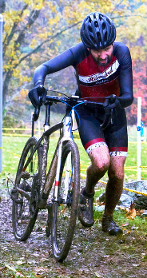About Me
Michael S. Kester, PhD Candidate (CV)
 I'm nearing the end of the final year of my Computer Science PhD in the School of Engineering and Applied Sciences
(SEAS) at
Harvard where I am advised by
Stratos Idreos as a member of
DASlab,
the Data Systems Laboratory. In general, I haven't met a part of computer science
that I don't like but my current research is focused on innovative data system architectures and software.
I'm nearing the end of the final year of my Computer Science PhD in the School of Engineering and Applied Sciences
(SEAS) at
Harvard where I am advised by
Stratos Idreos as a member of
DASlab,
the Data Systems Laboratory. In general, I haven't met a part of computer science
that I don't like but my current research is focused on innovative data system architectures and software.
Prior to Harvard, I worked as a software engineer at athenahealth, and before my career in technology, I attend culinary school at The Culinary Institute of America and cooked and tended bar professionally.
I'm also an avid cyclist and the Captain of the Harvard University Cycling Association Cyclocross Team. We had a phenomenal season this past Fall.